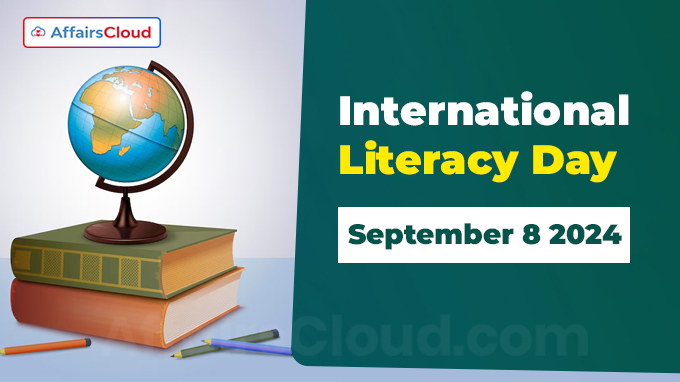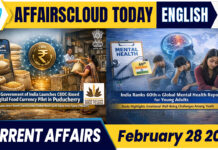 The United Nations Educational, Scientific and Cultural Organization (UNESCO)’s International Literacy Day (ILD) is annually observed across the globe on 8 September to remind the international community of the importance of literacy for individuals, communities, and societies.
The United Nations Educational, Scientific and Cultural Organization (UNESCO)’s International Literacy Day (ILD) is annually observed across the globe on 8 September to remind the international community of the importance of literacy for individuals, communities, and societies.
Theme:
The theme of ILD 2024 is “Promoting Multilingual Education: Literacy for Mutual Understanding and Peace“.
- The 2024 theme emphasises using first-language-based, multilingual approaches to literacy, which enhances cognitive, social, and economic benefits while promoting mutual understanding and respect.
Objectives:
- To raise awareness about the significance of literacy as a matter of dignity and human rights.
- To Advance the literacy agenda towards a more literate and sustainable society.
- To Highlight the ongoing challenges in promoting literacy worldwide.
Significance:
i.Literacy is a fundamental human right, fostering global citizenship, respect for equality, and non-discrimination.
ii.ILD 2024 highlights the transformative power of literacy to foster mutual understanding and peace in multilingual contexts.
iii.It also explores possible solutions for enhancing policies, lifelong learning systems, governance, programs, and practices.
Background:
i.The concept of celebrating ILD was first proposed during the inaugural “World Congress of Ministers of Education on the Eradication of Illiteracy,” held in Tehran, Iran from 8–19 September 1965.
- The Congress proposed the 8th of September (the inaugural day of the Congress) as International Literacy Day.
ii.In 1966, the General Conference of the Member States of UNESCO adopted the resolution (UNESCO 14 C/Resolution 1.441) at its 14th session in Paris, France, proclaiming the 8 September of every year as International Literacy Day.
iii.The first-ever International Literacy Day was observed on 8 September 1967.
Key Facts:
i.About 50 years ago, almost one-quarter of youth lacked basic literacy skills, compared to less than 8% in 2021.
- This positive trend can be attributed to the expansion of basic education over the decades.
ii.Between 2015 and 2023, the global completion rate has increased from 85% to 88% in Primary Education (PE), from 74% to 78% in Lower Secondary Education (LSE), and from 53% to 59% in Upper Secondary Education (USE).
iii.Despite these gains, the global youth and adult literacy rate for the population aged 15 years and older increased by just 1% (from 86% to 87%) between 2016 and 2023.
iv.In 2023, at least 1 in 10 young people and adults still lacked basic literacy skills.
v.Despite progress, 754 million adults lack basic literacy skills, and 250 million children remain out of school.
- In addition, disparities persist across regions, countries, and populations, with women representing 63% of 754 million non-literate youth and adults.
2024 Events:
i.The ILD 2024 global celebration was organised jointly by UNESCO and the Government of Cameroon from 9–10 September 2024, in Yaoundé, Cameroon. The events featured:
- A Global Conference on ‘Promoting Multilingual Education: Literacy for Mutual Understanding and Peace’;
- Award ceremony of the UNESCO International Literacy Prizes;
- Regional and National celebrations;
ii.An Annual meeting of the Global Alliance for Literacy within the Lifelong Learning Framework (GAL) and of the Action Research on Measuring Literacy and Alternative Education (RAMAED), with contributions from the UNESCO Global Network of Learning Cities (GNLC) was also organised as a Side Event.
UNESCO International Literacy Prizes (ILP):
i.On the occasion of ILD 2024 (8 September 2024), Audrey Azoulay, Director-General (DG) of UNESCO, has awarded the winners of the UNESCO International Literacy Prizes (ILP) 2024.
ii.Since 1967, UNESCO ILP has been rewarding excellence and innovation in literacy. Currently, there are 2 UNESCO ILP:
- The UNESCO King Sejong Literacy Prize (3 awards), and
- The UNESCO Confucius Prize for Literacy (3 awards)
iii.Through these prestigious Prizes, UNESCO seeks to support effective literacy practices, promoting dynamic literate societies.
iv.The 2024 UNESCO ILP was awarded to 6 exceptional literacy programs from Austria, Egypt, Ghana, Indonesia, Nigeria, and Panama.
UNESCO King Sejong Literacy Prize:
i.The UNESCO King Sejong Literacy Prize was established in 1989, with the support of the Government of the Republic Of Korea (ROK).
ii.It recognises contributions to mother language-based literacy development.
2024 receipients:
- ‘voXmi educational network’ program by the University College of Teacher Education Vienna (Austria);
- The ‘Libraries Without Walls’ program by the Foundation for Educational Equity and Development (FEED) (Ghana).
- ‘ProEd LECTO LABS’ program by Fundación ProEd (Panama).
Note: Each of the 3 UNESCO King Sejong laureates receives an endowment of USD 20,000; a medal; and a diploma.
UNESCO Confucius Prize for Literacy:
i.The UNESCO Confucius Prize for Literacy was established in 2005, with the support of the Government of the People’s Republic of China (PRC).
ii.It recognises contributions to functional literacy, leveraging digital tools, in support of adults in rural areas and out-of-school youth.
2024 receipients:
- The ‘Illiteracy Eradication Project’ (IEP) by Mansoura University (Egypt);
- The ‘Sokola Literacy Education for Indigenous Indonesians‘ program by the Sokola Institute (Indonesia);
- ‘FastTrack’ program by the Aid for Rural Education Access Initiative (AREAi) (Nigeria).
Note: Each of the 3 UNESCO Confucius laureates receives an endowment of USD 30,000; a medal; and a diploma.
International Conference on ‘Spectrum of Literacy’:
On 7th September 2024, Sanjay Kumar, Secretary of the Department of School Education and Literacy (DoSEL), the Ministry of Education (MoE) chaired an international conference titled “Spectrum of Literacy” at the Central Institute of Educational Technology (CIET), National Council of Educational Research and Training (NCERT) in New Delhi, Delhi.
- The virtual conference was organised by the MoE as a prelude to ILD 2024.
- The conference, underscoring the theme “Spectrum of Literacy”, reflected the broad and diverse challenges and opportunities in education globally.
Objective: To provide a platform to explore the diverse aspects of literacy in today’s world, engaging both national and international experts in meaningful discussions.
Key People: Archana Sharma Awasthi, Joint Secretary, DoSEL; Professor Dinesh Prasad Saklani, Director of NCERT; Joyce Poan, Chief of the Education Sector at UNESCO’s Regional Office for South Asia; among others were present during the event.
Key Highlights:
i.The conference highlighted the role of Understanding Lifelong Learning for All in Society (ULLAS)-Nav Bharat Saaksharta Karyakram, a program introduced to foster adult literacy across India.
- ULLAS-Nav Bharat Saaksharta Karyakram or New India Literacy Program (NILP) is a centrally sponsored scheme implemented from 2022-2027 in alignment with the National Education Policy (NEP) 2020.
ii.The conference featured 2 engaging sessions titled “Exploring the ‘Spectrum of Literacy’ in India” and “Global Perspectives on Literacy Chaired”.
VP Jagdeep Dhankhar Presided the ILD Celebrations
On 8 September 2024, Vice President Jagdeep Dhankhar presided as Chief Guest at the ILD 2024 celebrations at Vigyan Bhawan in New Delhi, Delhi.
- DoSEL under MoE celebrated the ILD 2024 in collaboration with UNESCO.
- Jayant Chaudhary, Minister of State (MoS) for MoE and Sanjay Kumar, Secretary, DoSEL were present during the event.
Points to Note:
i.Union Minister Jayant Chaudhary urged all States and Union Territories (UTs) to fully embrace the ULLAAS (Understanding Lifelong Learning for All in Society) initiative and work towards achieving total literacy by 2030.
ii.During the event, A special film on ULLAS – Nav Bharat Saaksharta Karyakram, was launched. This captured the journey, milestones, and success stories of the program.
iii.The event also witnessed the launch of ULLAS DTH Channel, a significant step towards reaching learners across the nation through literacy programs in multiple languages.
Note: As per Census 2011, the literacy rate at all India level is 72.98% and the literacy rate for females and males are 64.63% and 80.9% respectively.




